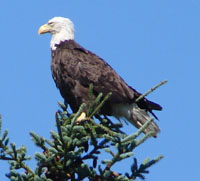I got up early one morning and happened to look out my second-story bedroom window. There in an oak tree, directly across from me, was a Bald Eagle as tall as a skateboard. We were eye to eye, and gazed at each other for a minute or so, before he spread his wide wings and flew. It remains one of my all-time favorite wildlife sightings. And I owe it to Rachel Carson.
 The aerial spraying of DDT in the 1950s was responsible for severe population declines in many bird species, and eventually, the Bald Eagle was put on the federal endangered species list.
The aerial spraying of DDT in the 1950s was responsible for severe population declines in many bird species, and eventually, the Bald Eagle was put on the federal endangered species list.
Carson’s renowned book, Silent Spring, was published in 1962, and revealed the connection between pesticides and bird declines. DDT was banned in 1972, and Carson’s work is credited with starting the current-day environmental movement. Bald Eagles are no longer on the endangered species list.
The Natural Resources Council of Maine began in 1959, so I like to think that Rachel helped us and we helped her. The committed Maine people who started NRCM to protect the Allagash River and fight against the Big A dam were already questioning the unbridled march of industry across the landscape and its impact on all of nature—air, land, water, wildlife. Rachel Carson gave us a toolkit of scientific facts that would help us in our future work. Together, we challenged the belief that damage to nature was an inevitable cost of progress.
I grew up in the 1960s and 70s with the environmental movement shaping my views, and here I am today, with the best job I can imagine. NRCM has been working to protect Maine’s environment for 52 years. We have helped to pass some of the leading laws in the nation to reduce the amount of mercury, lead, and other toxics from our waste stream and everyday products. The power of citizen action is alive and well in Maine.
Rachel Carson always asked us to tap into that deep sense of wonder that nature brings us, like looking out my window at that majestic eagle and just feeling, “WOW!” When that experience is threatened, and we are faced with ill health due to chemicals or unclean water, when we see fewer and fewer birds every year, when we feel the ever-rising temperatures from climate change, then we feel scared and mad and the intense need to do something. There’s always something we can do.
Earth Day is here, and it’s a good time to be more conscious of the decisions we make every day and to try something new. NRCM is featuring our 55 new solar panels today for our celebration of Earth Day. We’re generating electricity and saving money, too. What can you do?
- Get some facts.
- Put in a CFL light bulb.
- Hang your laundry out to dry.
- Wash out and recycle more plastics.
- Walk somewhere instead of driving.
- Contact your local legislator or Congressperson about an issue that matters to you.
And be sure to go outside, take a deep breath, and just experience the wonder of nature. She’s there for us, every day.
—Lisa Pohlmann, NRCM Executive Director
Related: Get to know the Bald Eagle, an NRCM website Creature Feature











Many thanks to all who made possible the Earth Day event honoring Rachel Carson. It was such an informative and worthwhile evening. I am grateful for the very important work that each panel member is dedicated to on behalf of all of the citizens of the great State of Maine.